Hello and welcome back!
This week I published a pastoral letter, A New Pentecost: Inviting All To Follow Jesus on evangelization. I am issuing this letter to coincide with the great Feast of Pentecost, which marks the beginning of the Church’s apostolic missionary outreach after the outpouring of the Holy Spirit upon the disciples.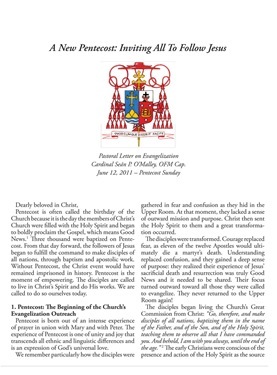
It is a way for us to emphasize the fact that the Catholics Come Home initiative is not just about the television commercials, but urging all the members of the Catholic community into the missionary endeavor of evangelization, to be a welcoming and inviting Church and to spread the Gospel in a very purposeful way.
I encourage you all to read this important pastoral letter, which I am including at the end of this post.
– – –
Once again Boston is connected to the process of canonization, as we were in the process of St. Edith Stein and Blessed Cardinal John Henry Newman. Last week, we opened the cause of sainthood here in the archdiocese for Father Joseph Muzquiz.
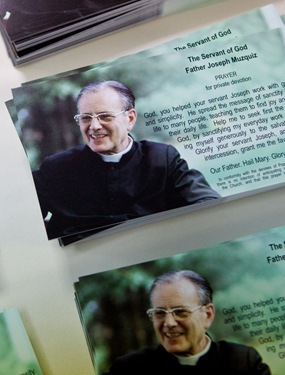
Father Muzquiz was a close collaborator with the founder of Opus Dei, St. Jose Maria Escriva, and was instrumental in bringing the ministry of Opus Dei to several places in the Americas, including the United States.
During his life Father Muzquiz travelled a great deal, but he spent his final years in Boston and is buried in St. Joseph Cemetery in West Roxbury.
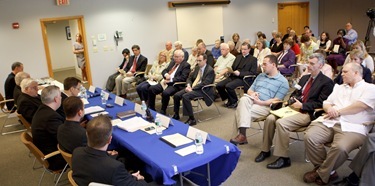
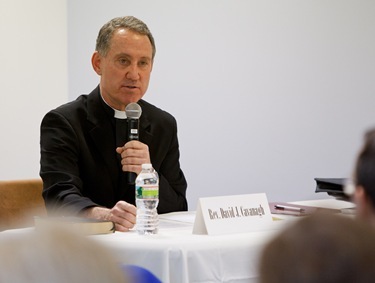
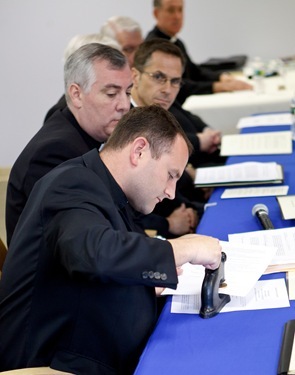
We pray that the inspiration of his life and holiness will have an impact on the lives of the people here in Boston who knew of him and were beneficiaries of his ministry. We look forward to hearing more about the process as it goes forward.
– – –
On Thursday I went to Pope John Paul II Catholic Academy Lower Mills Campus where Peter and Carolyn Lynch received the school’s annual Founder’s Award.
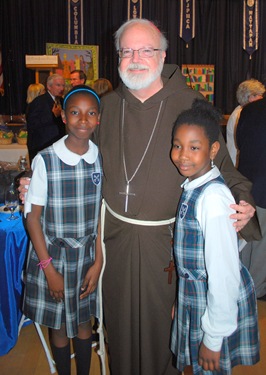
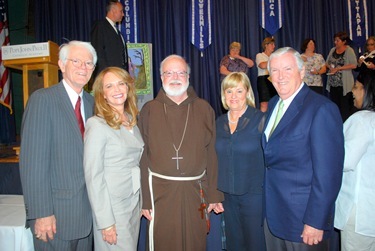
With Peter and Carolyn Lynch and Jack and Eileen Connors, who present the Founder’s Award
Also during the evening the Yawkey Foundation Teaching Award was presented to five teachers: Kathleen Duggan, Lisa Warshafsky, Kathleen Shaughnessey, Linda Roach and Mary Swanton.
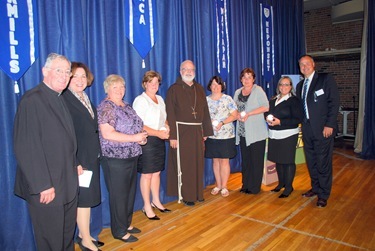
I am sure all the teachers are doing great things, but that evening we had the chance to witness the extraordinary work Mary Swanton is doing first hand as the choir and musical director. As part of the program one group of children sang and another had their violins.
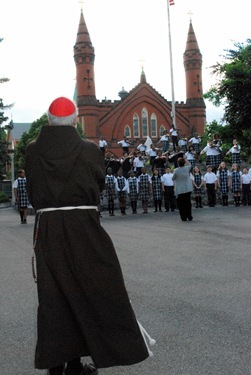
This is just one indication of the great progress they have made in introducing many cultural aspects to the education of Pope John Paul II Academy.

Carolyn and Peter Lynch have raised over a 100 million dollars for scholarships for inner-city school children and their commitment to Catholic education has been of an extraordinary benefit to the Catholics of the Archdiocese. We’re very grateful to them and very pleased that they were given the Founders Award.
– – –
On Friday I went to Merrimack College to attend the Mystical Body Mystical Voice liturgy conference that explained upcoming changes in the English translation of the Roman Missal. Everyone was pleased with the event that was very well-attended.
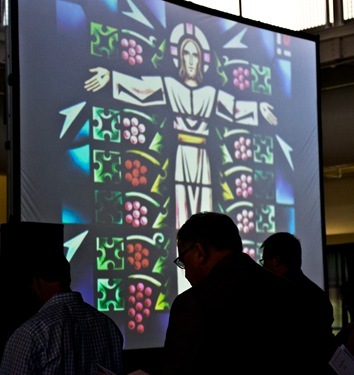
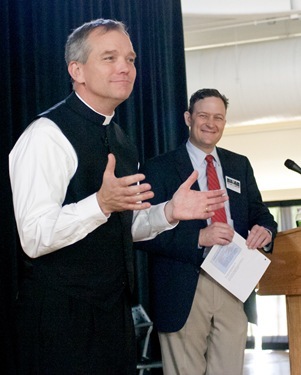
The speakers, Father Douglas Martis and Christopher Carstens, got very high marks for their talks!
I was at the mid-day prayer celebration and addressed the group and thanked them for being teachers of prayer in their parishes. I underscored what an important opportunity this is for all of us to reintroduce Catholic people to the centrality of the Sunday Eucharist in our lives.
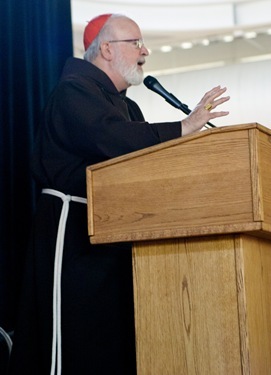
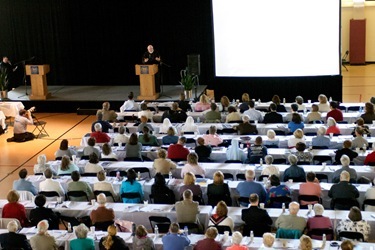
– – –
On Saturday morning we had the funeral Mass for Father Jim Lyons at St. Francis Parish in Dracut. Father Michael Lawlor gave a beautiful homily.
Father Lyons was a very beloved priest of the Archdiocese and the outpouring of affection toward him was very evident. A number of people were there, relatives and former parishioners, and many of his fellow priests.
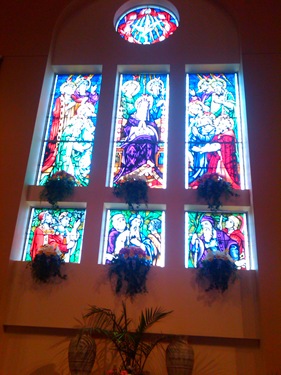
I did take a picture of the window there, because we were within the Pentecost Novena and I was struck by the beauty of it.
– – –
Then in the afternoon there was a confirmation ceremony in the Extraordinary Form at the Cathedral. They were parishioners from the cathedral, as well as from St. Adelaide’s. In all, there were about 20 confirmed.
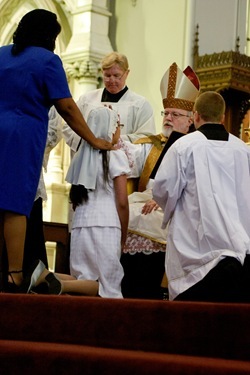
In the Extraordinary Form, confirmation is not celebrated within the Mass, so it was celebrated before they had their regular Mass.
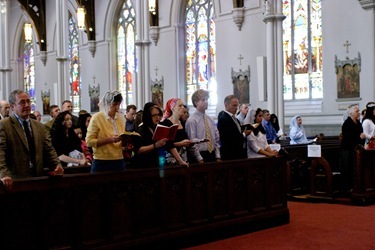
When I was confirmed, we had benediction rather than a Mass. Our confirmations were traditionally held in the evenings and, since the eucharistic fast was observed from midnight on, you didn’t want have the children fasting all day.
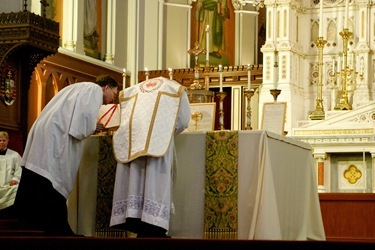
But they did a Mass following the confirmation ceremony that Father Raymond Van De Moortell celebrated. He often helps out with the Mass at the cathedral with the Extraordinary Form. The choir did an outstanding job with the music both for the confirmation ceremony and the Mass itself.
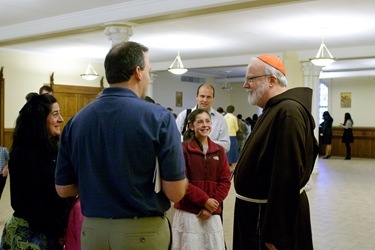
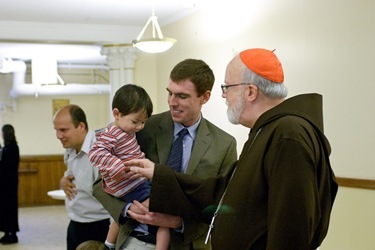
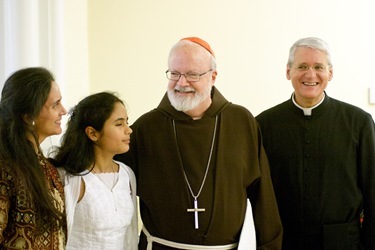
It was a very lovely celebration.
– – –
Also on Saturday I visited Sancta Maria House, a shelter for women very close by the Cathedral, which has been there almost 40 years. It was Mary McHale and other members of the Legion of Mary who founded the house. It’s supported entirely by private donations, they get no public funds.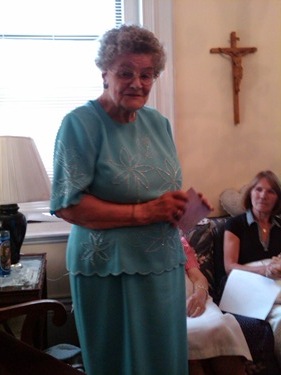
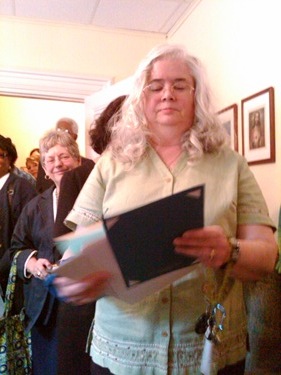
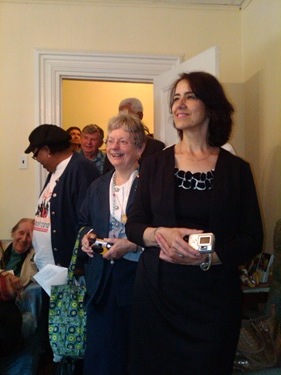
Each year, they serve to about 3,000 homeless women. They are also very active in working to get people off the streets and helping them to find jobs.
They have a beautiful home there for the women, the put something like 14 women up for the night. They supply them with clothes and toiletries. And they have volunteers that come in each night and come spend the night, supervising the house.
Many of the women who have gone through the program of Sancta Maria have returned as volunteers and very supportive of the program there.
It’s a very beautiful work inspired by the Legion of Mary. The Legion of Mary is a very important lay movement founded in Ireland by Frank Duff. When I was growing up it had big influence on my own life and I was very happy to visit Sancta Maria House and bless the house and the garden and to pray with them the Legion of Mary prayers.
– – –
On Sunday I went to St. John the Evangelist Parish in Canton for their 50th anniversary, and I celebrated Mass there with Father Michael F. McLellan.
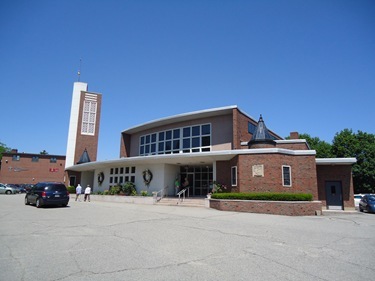
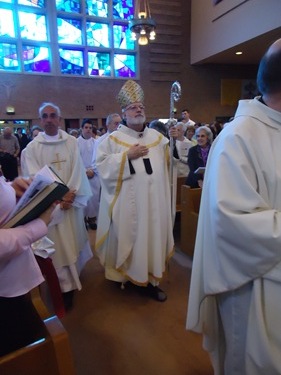
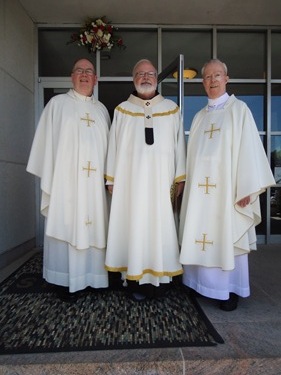
– – –
This year was the 35th Anniversary of St. Elizabeth’s Comprehensive Addiction Program (known as SECAP) at St. Elizabeth’s Medical Center. So I was pleased to be able to attend the celebration marking the occasion on Tuesday.
During the program, State Senator Steve Tolman gave a very inspiring address.
I was also pleased to see the new president of St. Elizabeth’s, John Polanowicz, there.
Deirdre Houtmeyers and Dr. Barbara Herbert are very involved with this program that been providing care for people with alcohol and drug addictions for so many years.
Congratulations to all those involved with the SECAP program. Clearly a great number of lives have been changed for the better, and some surely saved, because of your important work.
– – –
On Tuesday, I attended an ecumenical gathering at Boston University for the Presiding Bishop of the Episcopal Church of the United States, Bishop Katharine Jefferts Schori, prior to the Episcopal City Mission’s Annual Meeting.
The gathering was hosted by the local Episcopal Bishop Thomas Shaw and two of his suffragan bishops, Bishop Bud Cederholm and Bishop Gayle Harris.
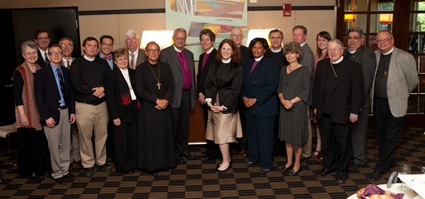
Among the many people there to meet Bishop Jefferts Schori were Bishop Margaret Payne of New England Synod of the Evangelical Lutheran Church in America; Dr. Mary Elizabeth Moore, who is dean of the BU School of Theology; and Rev. Jack Johnson and Rev. Joel Anderle of the Massachusetts Council of Churches.
I also invited Bishop Arthur Kennedy to accompany me to the gathering. Bishop Kennedy is a member of the Anglican-Roman Catholic dialogue. In fact, he recently returned from a meeting of the dialogue at an ecumenical monastery in Bose in the north of Italy, so I was very happy that he was able to be present.
– – –
At the Boston College club there was a farewell dinner for Monsignor Cornelius McRae who is taking on a new post as spiritual director at Casa Santa Maria, which is the graduate house for the North American College in Rome. He had worked in Rome before and will be a very important addition to their staff. Many bishops have expressed their gratitude for our willingness to send Monsignor McRae there.
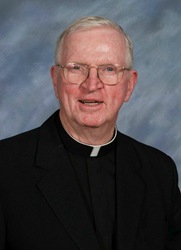
There he will work with another former rector of Blessed Pope John seminary, Monsignor Francis Kelley. We wish him many blessings and happiness and good health in this new ministry which is important contribution to the life of the Church.
– – –
On Wednesday morning, I met with Father Bob Monagle who is a chaplain in the Air Force and a Boston priest, who has been deployed a number of times and is now going to be stationed in a military base in Turkey.
I was very pleased to have a chance to see him and hear a little bit about his ministry
– – –
At noon, I celebrated the 25th anniversary Mass for some of our jubilarian priests here at the Pastoral Center.
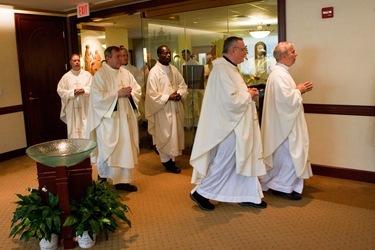
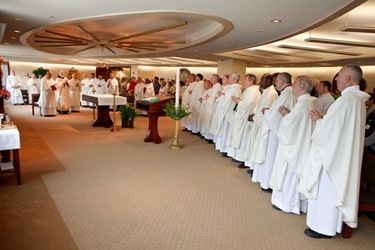
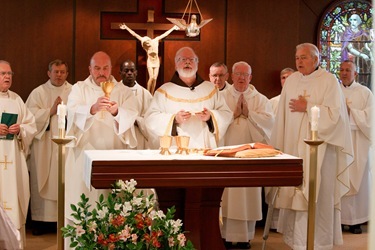
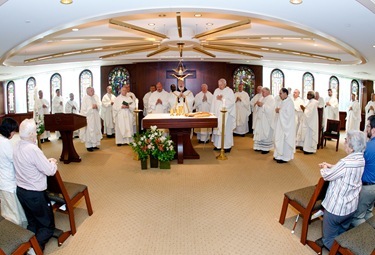
Bishop Christopher Coyne, recently installed as the auxiliary of the Archdiocese of Indianapolis, is a member of that class, as well.
It is always important for us to mark these anniversaries to express our gratitude for the faithful service of these priests. These 13 priests represent 325 years of service, thousands of Masses, thousands of people’s lives touched by their ministry. It is also a call to a greater appreciation and gratitude for the gift of the priesthood that allows the ministry of the Good Shepherd to be visible in a very striking way.
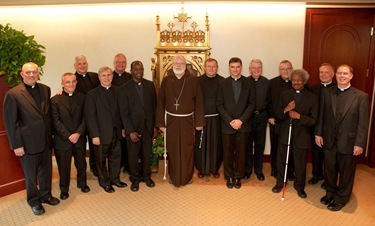
Congratulations to all our jubilarians!
– – –
Finally, in the afternoon, I met with a group of doctors, researchers and parish representatives working on a new program called CRUZA to promote cancer screening and awareness in the Latino community through the parishes. 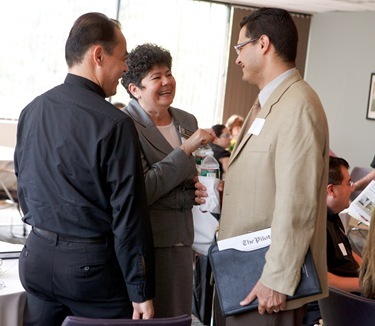
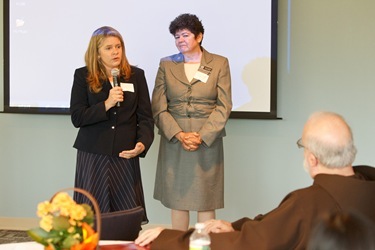
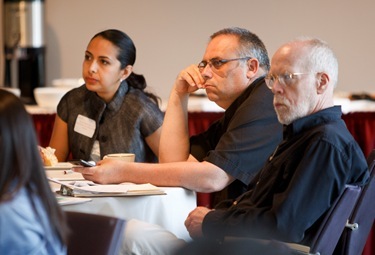
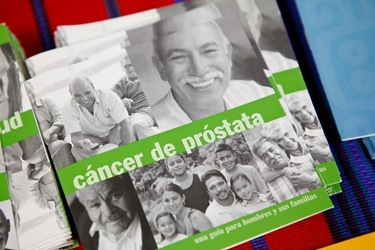
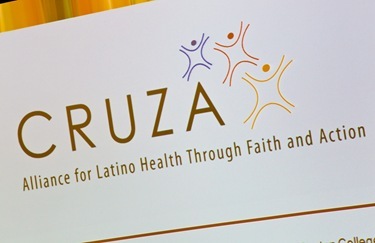
CRUZA is a partnership of the Gaston Institute of UMass Boston and the Dana Farber Cancer Center.
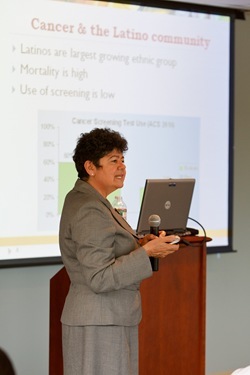
Cancer is the leading cause of death among Latinos, yet many in the immigrant community don’t receive the important information and screening they need to help prevent this.
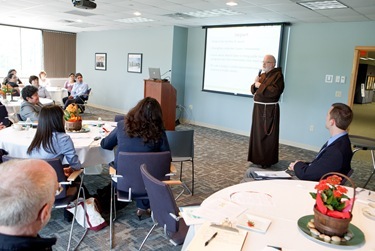
The idea behind CRUZA is to bring education programs to people though the churches, which for many immigrants, is the center of community life.
It was wonderful to meet the representatives of this organization and hear about their plans and we look forward to working with them.
– – –
Finally, as I mentioned, I conclude this post with the text of my Pastoral Letter, A New Pentecost: Inviting All To Follow Jesus.
A blessed Pentecost to you all!
A New Pentecost: Inviting All To Follow Jesus
Pastoral Letter on Evangelization
Cardinal Seán P. O’Malley, OFM Cap.
June 12, 2011 – Pentecost Sunday
Dearly beloved in Christ,
Pentecost is often called the birthday of the Church because it is the day the members of Christ’s Church were filled with the Holy Spirit and began to boldly proclaim the Gospel, which means Good News. [i] Three thousand were baptized on Pentecost. From that day forward, the followers of Jesus began to fulfill the command to make disciples of all nations, through baptism and apostolic work. Without Pentecost, the Christ event would have remained imprisoned in history. Pentecost is the moment of empowering. The disciples are called to live in Christ’s Spirit and do His works. We are called to do so ourselves today.
1. Pentecost: The Beginning of the Church’s Evangelization Outreach
Pentecost is born out of an intense experience of prayer in union with Mary and with Peter. The experience of Pentecost is one of unity and joy that transcends all ethnic and linguistic differences and is an expression of God’s universal love.
We remember particularly how the disciples were gathered in fear and confusion as they hid in the Upper Room. At that moment, they lacked a sense of outward mission and purpose. Christ then sent the Holy Spirit to them and a great transformation occurred.
The disciples were transformed. Courage replaced fear, as eleven of the twelve Apostles would ultimately die a martyr’s death. Understanding replaced confusion, and they gained a deep sense of purpose: they realized their experience of Jesus’ sacrificial death and resurrection was truly Good News and it needed to be shared. Their focus turned outward toward all those they were called to evangelize. They never returned to the Upper Room again!
The disciples began living the Church’s Great Commission from Christ: “Go, therefore, and make disciples of all nations, baptizing them in the name of the Father, and of the Son, and of the Holy Spirit, teaching them to observe all that I have commanded you. And behold, I am with you always, until the end of the age.” [ii] The early Christians were conscious of the presence and action of the Holy Spirit as the source of holiness, gifts of grace, and apostolic zeal.
2. The New Evangelization & Our Catholics Come Home Initiative
There are over one billion Catholics in the world today and we are indebted to the first disciples, and those who followed them, for handing on the faith to each subsequent generation, sometimes in very challenging circumstances and often at the cost of their own lives. We are entrusted today with that same Great Commission the first disciples received.
The day of Pentecost was the first outreach. Through the New Evangelization that Blessed John Paul II called the Church to embrace, we are reaching out again to those who have drifted away from the Church. Like the original disciples, we too rely on the power and grace of the Holy Spirit for our efforts. Pope Benedict XVI emphasized this mission during his Apostolic Journey to the United States in 2008 when he called for “a new Pentecost for the Church in America” during his homily at St. Patrick’s Cathedral in New York. [iii]
In that homily, Pope Benedict commented on the stained glass windows. When we look at them from outside, the Holy Father said, they seem dark and dreary, but inside the church the windows are splendid with light and color, and a beauty that teaches the mysteries of faith. One can only really appreciate the beauty of the Church from the inside. The Church is a gift to mankind, which has been brought into being according to the eternal plan of God. Her mission is to continue Christ’s work of salvation. The Church is at the service of our authentic freedom by opening a window onto God and the eternal. The Church takes us beyond the limitations of this world; it points to the depths of God’s love for us. We must never tire of inviting people to come into the Church, to discover the beauty and light inside. Part of our mission is to build up the body of Christ, the Church, by being an inviting and welcoming community.
We are conscious of the fact that many Catholics here in the Archdiocese of Boston do not join us regularly for the celebration of the Sunday Eucharist. Much like the disciples on that first Pentecost, we see friends and relatives who are not deeply connected with our Church family. For that reason, I initiated the Catholics Come Home outreach effort this past Lent. The central element of this initiative was the broadcasting of inspiring television messages about the roots of our faith, the power of Christ’s forgiveness and the peace and joy that comes from a return to worshipping together. Pastors are reporting that individuals are returning to Mass and the sacraments after seeing these commercials. We are encouraged by pastors who have been sharing that many people are inquiring about entering the Church through RCIA or returning to the Church. God’s grace is allowing our initiative to bear fruit.
Yet, as beautiful and effective as the televised messages are, they make up only a part of what must become a sustained campaign of outreach and welcome. During the Lenten season, parishes across the archdiocese undertook strategies to invite and welcome Catholics back. Greeters were stationed at the doors of churches at Sunday Masses, priests made themselves more available for Confession, posters and banners welcomed people who were new or returning, and pastors sent letters to parishioners who had been away. Practicing Catholics were encouraged to share with their relatives, friends, neighbors and co-workers the many ways that their faith enriches their lives. I am very grateful for these efforts, especially because they have served to reinvigorate the faith of parishioners throughout our parishes.
We are now in the post-television phase of this campaign, but we cannot relax our efforts to invite and welcome people back. In the same spirit of confidence and optimism that characterized this Lenten initiative, I ask you to continue to pray for those who are away from the Church, that their hearts may be opened to respond positively to our invitation. Continue to invite them to return home, reminding them that God has placed a longing for Him in their hearts and explaining that the community of faith suffers from their absence. Through one-on-one and parish-based initiatives, continue to listen to their questions and concerns and to ease their feeling of estrangement, born of years, maybe even decades, away from the life of the Church. Please share with them your own story of living the faith.
3. Evangelization Starts with Each Catholic’s Ongoing Conversion
We can only share what we have received. In preparing to evangelize, we are called to conversion, which means continually to receive the Gospel of Jesus Christ individually and as a Church. The Good News nurtures us, makes us grow, and renews us in holiness as God’s people.[iv]
Conversion is ongoing in the hearts of believers and it consists in knowing not just about Jesus, but in actually knowing Jesus. It comes about through the power of the Holy Spirit who gives us the grace to invite Jesus into our lives, to put on the mind of Christ by rejecting sin, and to accept the call to be ever more faithful disciples of Christ in the Church. It is a fruit that comes from prayerful dialogue with Christ our Redeemer. Unless we undergo such a conversion, we have not truly accepted the Gospel.[v]
We know that people experience conversion in many ways. Some experience a “sudden, shattering insight that brings rapid transformation. Some experience a gradual growth over many years. Others undergo conversion as they take part in the Rite of Christian Initiation of Adults — the usual way adults become members of the Church today. Many experience conversion through the ordinary relationships of family and friends. Others have experienced it through the formation received from Catholic schools and religious education programs. Still others have experienced ongoing conversion in renewals, ecumenical encounters, retreats, parish missions, or through some of the great spiritual movements that have blessed Church life today.”[vi]
Personal conversion for each of us will involve different steps depending on our relationship to Jesus and his Church. “For those who practice and live our Catholic faith, it is a call to ongoing growth and renewed conversion. For those who have accepted it only in name, it is a call to re-evangelization. For those who have stopped practicing our faith, it is a call to reconciliation. For children, it is a call to be formed into disciples through the family’s faith life and religious education. For other Christians, it is an invitation to know the fullness of our message. For those who have no faith, it is an invitation to know Christ Jesus and thus experience a change to new life with Christ and his Church.”[vii]
One college student who entered the Church this Easter gave a beautiful testimony of her own conversion. “I have grown to recognize God’s presence in all people and all things, and I consistently find myself joyfully surprised by the action of His grace in my life and in the larger world. God’s light has infused and informed my perspective so deeply that I cannot fathom a life without it, and through my entrance into the Catholic Church, I hope to live my life as one unbroken gaze upon the face of God, and respond to our universal call to holiness.”[viii] This young woman’s encounter with the Gospel left her with a different vision of what life is and a new paradigm for how to live it. Her faith, well-nurtured, lively and deep, will make her a great witness to the truth of the Gospel. By her testimony, she is already a great evangelizer!
4. The Primary Mission of Our Church
Evangelization must be the first focus of our Church. Then, the corporal and spiritual works of mercy, which result from living and sharing the Gospel, will transform the culture around us. We have the mission “to repair the world,” what the Jews call Tikkun olam.
Evangelization includes working for justice and caring for the material needs of others. In a scene from the Epic commercial prepared for our Catholics Come Home campaign in Boston, the pastor of a suburban parish is shown handing food to a homeless man sitting on the steps of a church. The scene reminds us that the work of sharing the Gospel message places very practical demands on us. There is a direct consequence of witnessing to Christ our Savior and seeking justice. We are our brothers’ and sisters’ keepers with regard to their basic human needs and the protection of their dignity; if we really love Christ, we will help them. [ix]
The scene in Epic has allegorical meaning as well. It reminds us that so many in our archdiocese are starving for spiritual food. They seek longingly for hope and meaning — in their families, their work, their social and political lives — just as the hungry seek for bread. They may be traveling past our churches; indeed, they may be sitting just outside the doors. All we need to do is reach out to them with a word or gesture to assure them that we want to ease their spiritual and physical need.
Within the Archdiocese of Boston, we have many excellent ministries focused on practicing the corporal works of mercy (those that care for bodily and material needs). Parishioners are very involved in feeding the hungry, providing clothes and shelter, visiting the sick and prisoners. This is an inspiring part of how we witness to living our Catholic faith and it is why we are involved in Catholic Charities, Saint Vincent de Paul, Catholic Relief Services, health care, orphanages, meal centers, food pantries, shelters and cemeteries.
I pray that each of us in our Catholic community will also practice the spiritual works of mercy (those that care for the soul) with as much fervor. Together as one Catholic family, we can do more to teach the uninformed, counsel the doubtful, help people turn from sinful to virtuous behavior, bear wrongs patiently, forgive offenses willingly, comfort the afflicted and pray for the living and the dead. Evangelization is a central way we incorporate the spiritual works of mercy into our lives and the activities of our parishes.
5. The Meaning of Evangelization
Evangelization involves handing on the faith to our own families; in other words, becoming mentors in this way of life to a new generation of disciples. As Saint Paul reminds us with passion, we are all called to be “ambassadors of Christ.”[x]
I hope, through our efforts, that together we will restore the word “evangelization” to its proper meaning. It means simply to share the Gospel, the Good News, through word and deed. That is why the four Gospel writers, Matthew, Mark, Luke and John, are called “Evangelists.”
Over time the word “evangelization” has developed negative connotations for some and been misunderstood to be an aggressive or manipulative form of proselytism. Catholic evangelization is never proselytism. Evangelization always seeks to propose our faith and never to impose it. It is always respectful of human dignity and authentic freedom.
The Church exists to evangelize, to share the Good News with all people. We are called to do many things in the Church, but our primary mandate given by Jesus and powered by the Holy Spirit is to evangelize. Correspondingly, every Catholic is asked to make it his or her own responsibility to reach out and encourage others to join with us in Christ’s family, the Church.
There are three ways to evangelize. We witness, which is the simple living of our faith through our good actions and virtuous deeds. We share our faith in an explicit way, typically by describing how God is working in our lives. We invite others to experience Christ’s saving love by walking with us in our Catholic Church.
Evangelization is most effective when actions come first. It is said that Saint Francis of Assisi often taught the friars to “preach always, and sometimes use words.” Through the grace of the Holy Spirit, evangelization happens “by the way we live God’s love in our daily life; by the love, example, and support people give each other; by the ways parents pass faith on to their children; in our life as Church, through the proclamation of the Word and the wholehearted celebration of the saving deeds of Jesus; in renewal efforts of local and national scope; in the care we show to those most in need; and in the ways we go about our work, share with our neighbors, and treat the stranger. In daily life, family members evangelize each other; men and women, their future spouses; and workers, their fellow employees, by the simple lives of faith they lead. Through the ordinary patterns of our Catholic life, the Holy Spirit brings about conversion and a new life in Christ.”[xi]
6. Parishes: Centers of Evangelization
If the Church exists to evangelize, the parish is the chief venue where that activity must take place. Our parishes must be true centers of evangelization.
The parish is the place where most Catholics experience the Church. It has, on the local level, the same commitments as the universal Church, with the celebration of God’s Word and the Eucharist as its center of worship. Evangelization inevitably involves the parish community because, ultimately, we are inviting people to the Eucharist, to the table of the Lord. When an individual evangelizes, one-to-one, he or she should have the Good News and the Eucharist as the ultimate message.[xii] Pope Paul VI said that evangelization is always tied to the Eucharistic celebration of the paschal mystery of Jesus Christ. “There is no true evangelization if the name, the teaching, the life, the promises, the Kingdom and the mystery of Jesus of Nazareth, the Son of God are not proclaimed.”[xiii]
An evangelizing spirit must touch every dimension of Catholic parish life. Welcome, acceptance, the invitation to conversion and renewal, reconciliation and peace must characterize the whole tenor of parish life — beginning with Sunday worship. Every element of the parish should respond to the evangelical imperative—priests and religious, lay persons, staff, ministers, organizations, social clubs, parochial schools, and parish religious education programs. Otherwise, evangelization is reduced to something a few people do as their particular ministry—rather than the reason for the parish’s existence and the objective of its apostolic work. The spirit of conversion, highlighted in the liturgy and particularly in the Rite of Christian Initiation of Adults, should radiate through all the ministries so that the call to conversion is experienced and celebrated as part of each parishioner’s life of faith.[xiv]
At this time, I ask that pastors, parish pastoral councils and parish evangelization teams re-commit themselves to advancing their understanding of their parish’s mission in a way that develops concrete evangelizing activities. In this effort, the Parish Evangelization Guide recently issued by the Secretariat for Faith Formation & Evangelization, will be a useful beginning. I know that you will continue to rely on the Rite of Christian Initiation of Adults in order to respond more effectively to Catholics returning to the faith. As you know, continued emphasis on receiving the sacraments of Reconciliation and the Eucharist, Bible study, the study of the Catechism of the Catholic Church and encouraging ecclesial movements are a few proven ways in which you can continue to foster conversion and renewal of the faith among adults.
It is critical to emphasize that the work of evangelization cannot succeed if it is seen as the work of clergy and parish staff alone. Every one of us by our baptism and confirmation is called by Jesus to participation in this mission. Jesus is waiting for us to be willing to serve as an instrument to help Him lead others to joy, peace and love in this life and the next.
7. Pastoral Planning & Evangelization
Since evangelization is a central activity of our parishes, it will be a critical component in pastoral planning in our archdiocese.
There are many ways to identify a healthy, vibrant parish. A reverent and active sacramental life, strong and healthy programs of religious instruction and faith formation for young people and adults, vibrant apostolic and charitable activities rooted in Catholic social teaching, and a culture promoting vocations are some of those signs. However, one of the most important manifestations of vibrant parish life is having the resources and the spirit to evangelize, and particularly to reach out to those who have left the Church. I have asked our Archdiocesan Pastoral Planning Commission and our Pastoral Planning Office to propose strategies to improve the capabilities and resources for parish-centered evangelization activities as we look to strengthen and renew our parishes and archdiocesan outreach ministries.
Some may ask, “Why must we evangelize? Our parish is fine as it is.” We evangelize so that people can know the purpose for which they are made and so that as many as possible will be brought to Christ and ultimately, through Christ’s saving love, to the eternal presence of God in heaven. John’s Gospel recounts Jesus’ words, “I came so that they might have life, and have it more abundantly.”[xv] Our love for every person makes us want to extend this invitation on Christ’s behalf.
Paulist Father Robert Rivers has written a provocative book called, From Maintenance to Mission: Evangelization and the Revitalization of the Parish. His premise is that evangelization has the power to bring new unity to the Church in periods of upheaval, and can lead to an experience of reorientation within the Church and a renewed impact on the society in which we live in this new millennium.
Evangelization challenges all baptized Catholics to a conversion to Christ, by living their faith fully, inviting others to faith, and living these Gospel values in the world. It gives us a new lens through which we can view our Catholic faith. This lens is threefold: spiritual renewal, missionary activity, and action for justice in the world.
Many parishes are truly mission-based today and they have fervor for this outreach. Others are maintenance-oriented because their parishioners often have a consumer culture mentality. They come to Church to get something, and they expect the leadership to provide it. All the energy and resources of the parish are oriented to serving the people who are present, rather than reaching out to those who are absent.
We must work to help our parishioners to move beyond being consumers to being disciples who share actively in the mission and the ministry of Jesus. We are called to evangelize out of love for Jesus Christ and of the people who will be graced by what His Kingdom of love, peace and justice will bring to their lives.
This Good News is something we must desire to share. If a doctor had discovered a cure for cancer and said, “Well, I am going to use this only for my family and my close friends,” we would consider that criminal. Not sharing the power of the Gospel and the Sacraments with our neighbor is also criminal. The operative parable is the story of the man who buried the shining gold talent in the ground. This was condemned as an act of cowardice and selfishness.
Our task in our parishes is to foster ongoing conversion, turning consumers into disciples and disciple-makers. We need to prepare men and women who witness to the faith and not send people into the witness protection program. Every Catholic can be a minister of welcome, reconciliation, and understanding to those who have stopped practicing the faith.[xvi]
8. The New Roman Missal: An Opportunity for Evangelization
The changes to the Roman Missal that will be implemented this coming Advent should be seen as an opportunity to refocus our entire Catholic community on the centrality of the Sunday Eucharist. It is an opportune moment to study the liturgy and grow in our understanding of the central mysteries of the faith, making use of Teaching Masses and Family Masses.
It also provides an occasion for parishes to evaluate their current liturgies to make them even more beautiful and meaningful experiences. Our modern culture, so addicted to entertainment, can make it difficult to celebrate the Eucharist in a way that engages modern people. We must first teach people how to pray and encourage them to prepare for the Sunday Mass so that its mysteries will open up to them. The more people realize that Christ is truly present in the Holy Eucharist and speaks to us in the Word of God proclaimed, the more faithfully and fervently people will participate in Sunday Mass. In the Eucharist, the love of Christ gathers and builds us as living stones into the Church. Without the Eucharist, we remain as pebbles strewn on the beach. Saint Peter described this in his First Letter: “Come to him, a living stone, rejected by human beings but chosen and precious in the sight of God, and, like living stones, let yourselves be built into a spiritual house to be a holy priesthood to offer spiritual sacrifices acceptable to God through Jesus Christ.”[xvii]
Good work is already being done. Study of the Roman Missal and the changes in liturgical responses is leading to more careful liturgical planning and reverent liturgical practice in many parishes and chaplaincies; these revisions will bring about a renewed sense of the sacred.
9 . New Church Movements and Communities
After the Second Vatican Council, the Church has witnessed an outpouring of the Holy Spirit through the blossoming of new movements and ecclesial communities. They bring great vitality to the life of the Church. They are a sign of great hope for the Church in the new millennium.
The Church in every generation is both old and new. Throughout the centuries we have seen the great blessing of so many new religious orders, reform movements and lay associations that responded to the needs of a particular era. Today, many of the new movements and communities are showing great success in communicating a deep spirituality to their members in the context of small, close-knit communities. They energize their people to be evangelizers who bring the Good News they have received to those around them. Without those forces of renewal, the Church can sometimes become too focused on maintenance and the internal aspects of pastoral work.
Many of these small groups and communities are already present in the archdiocese: Cursillo, Charismatic Renewal, Communion and Liberation, Opus Dei, Focolare, Communities of Saint Egidio, The Neocatechumenal Way, ARISE, The Legion of Mary and others. Throughout the years I have known them and experienced firsthand the fruits of Christian life that sprout from their activity, including strengthening of family life, openness to life, and vocations to the priesthood and religious life.
Some of these groups have been instrumental in my own personal growth in faith. For instance, as a seminarian 44 years ago I experienced the power of a Cursillo retreat. It was in Spanish in Washington D.C. with a collection of Argentine soldiers, undocumented Salvadoran refugees, Cubans, and some Puerto Rican restaurant workers. The weekend forged us into a fraternity, a community of friends, fellow disciples on fire with our love for Christ and our desire to make Him known, loved and served. At the end of the Cursillo weekend, the Rector gave me a Cross and said “Cristo cuenta contigo.” And we answered, “Y yo con Su gracia.” Christ is counting on us. With Christ, with each other and with his grace, we can do it. It strengthened my vocation to the priesthood and helped me understand the need to look for the lost sheep.
Blessed Pope John Paul II was instrumental in discerning the Holy Spirit’s presence in these new movements and communities. In Pentecost of 1998 he met with many of these groups at St. Peter’s Square in the Vatican and offered them to the Universal Church as instruments for the New Evangelization. He told them: “In our world, often dominated by a secularized culture which encourages and promotes models of life without God, the faith of many is sorely tested, and is frequently stifled and dies. Thus we see an urgent need for powerful proclamation and solid, in-depth Christian formation. There is so much need today for mature Christian personalities, conscious of their baptismal identity, of their vocation and mission in the world! There is great need for living Christian communities! And here are the movements and the new ecclesial communities: they are the response, given by the Holy Spirit, to this critical challenge at the end of the millennium. You are this providential response.”[xviii]
We need to find ways to support their efforts and welcome them in our churches as they strive to provide individuals with a personal experience of the love of God, not only to those already practicing their faith but also to those who are away from the Church or have never met Christ.
10. Immediate Steps
Pastors, in consultation with their parish pastoral councils and staffs, will need to strategize on how best to evangelize in their local circumstances. Like Pentecost, the process must be steeped in prayer and the desire to be led by the Holy Spirit. The outreach that needs to be done will require planning and training. Some parishes may want to establish evangelization teams and pastoral zones within the parish for the purpose of outreach. Those involved would benefit from reading Go and Make Disciples, a document from the U.S. Conference of Catholic Bishops, which has recommended goals, strategies and tactics for the work of evangelization.
Faith formation is central to the task of evangelization. Training evangelizers to visit homes, to contact the families of children in religious education programs and youth ministry, and to be involved in outreach and welcoming must be part of the process. The RCIA programs are ways of helping the entire parish have a sense of mission and welcoming.
I encourage all Catholic families to develop a spirituality of the home that renews the practice of regular family prayer. Spouses: pray with one another; parents: pray with your children. Reach out to extended family members and Catholic friends and neighbors, and invite them to attend Mass with you. What a stronger Church we would be if every family was able to help just one other family return to the practice of our faith.
I ask all Catholics to pray to the Holy Spirit this Pentecost and to ask for the wisdom to understand the particular gifts God has given you for building up the Church. Ask the Holy Spirit to help you to recognize those people for whom God would like you to be the face of His Church. At the proper moment you can then invite them to return home to our blessed Catholic family.
11. That All May Know Jesus
Blessed Pope John Paul II traveled to the ends of the earth to share the Good News so that the world could come to know Christ Jesus. Like the late Holy Father, we must be convinced that the Kingdom of God is spread by word of mouth. Jesus says: “He who hears you, hears me.”[xix]
In Blessed John Paul II’s letter Novo Millennio Ineunte, he challenged us with the words of the Gospel, “Duc in Altum”, to “cast our nets into the deep.” He wrote: “We must rekindle in ourselves the impetus of the beginnings of the Church and allow ourselves to be filled with the ardor of the apostolic preaching which followed Pentecost. We must revive in ourselves the burning conviction of Paul who cried out: ‘Woe to me if I do not preach the Gospel.’” [xx] Let us repair and strengthen our nets together so that we might better carry out the mission that the Lord has given us, to be his ambassadors. “Faith is strengthened when it is given to others.”[xxi]
A missionary spirit can unite and energize our Church. Christ is the missionary of the Father, and we are Christ’s missionaries; we are fishers of men and women, not keepers of the aquarium. As Blessed John Paul II reminds us, we do not evangelize alone: “The risen Jesus accompanies us on our way and enables us to recognize Him as the disciples of Emmaus did in the breaking of the bread. [xxii] May He find us watchful ready to recognize His face and to run to our brothers and sisters with the good news: ‘We have seen the Lord.’”[xxiii]
Archdiocesan Catholics Come Home Prayer:
That All May Know Jesus[xxiv]
Father, you call each person by name
and have given your only Son Jesus
to reconcile us to you and to each other.
In your faithfulness, you sent
the Holy Spirit to complete
the mission of Jesus among us.
Open our hearts to Jesus.
Give us the courage
to live as followers of Christ.
Help us to speak his name
to all who are close to us and to share
his love with all who are far away.
We pray that every person everywhere
be invited to know Jesus as Savior
and will be made new by his infinite love.
We come to you and ask all this
through Christ, our Lord. Amen. [xxv]
Sincerely yours in Christ,
Cardinal Seán P. O’Malley, OFM Cap.
Archbishop of Boston
[i] Acts 2:14
[ii] Mt 28: 19-20
[iii] Pope Benedict XVI. Homily during Votive Mass for the Universal Church at St. Patrick’s Cathedral in New York City. 19 April 2008.
[iv]National Conference of Catholic Bishops, Go and Make Disciples: A National Plan and Strategy for Catholic Evangelization in the United States, November 1992, #23.
[v] Go and Make Disciples, #12.
[vi] Go and Make Disciples, #23.
[vii] Go and Make Disciples, #27.
[viii] Kaytlin L. Roholt, “Graduating Student Reflects on Becoming Catholic, The Aquinas, Vol. 84, Issue 19, 5 May 2011, p. 13
[ix] Go and Make Disciples, #60.
[x] Cf. 2 Corinthians 5:20.
[xi] Go and Make Disciples, #35.
[xii] Go and Make Disciples, #84.
[xiii] Pope Paul VI. On Evangelization in the Modern World (Evangelii Nuntiandi), no. 22.
[xiv] Go and Make Disciples, #85.
[xv] John 10:10.
[xvi] Go and Make Disciples, #40.
[xvii] 1 Pt 2:4-5
[xviii] Pope John Paul II. Speech For The World Congress Of Ecclesial Movements And New Communities. 27 May 1998.
[xix] Cf. Luke 10:16.
[xx] Novo Millennio Ineunte, #40. St. Paul quote from 1 Corinthians 9:16.
[xxi] Redemptoris Missio, #2.
[xxii] Cf. Luke 24:13-35
[xxiii] Novo Millennio Ineunte, #59 and John 20:25.
[xxiv] Cf. John 17:4.
[xxv] That All May Know Jesus. Official prayer of the Archdiocese of Boston Catholics Come Home Initiative. Written by David Thorp.
